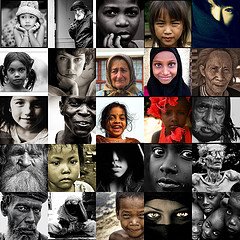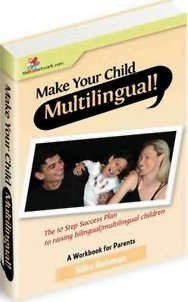Bilingualism
and Translation Profession
The many voices of the world
 Photo courtesy of pardeshi, initially published on Flickr
Photo courtesy of pardeshi, initially published on FlickrBilingualism is fluency in two languages. Sometimes, people acquire the second language through good school education. Sometimes, they master the second language after emigration to the other country either in childhood or in adult life. But most often, they learn two languages simultaneously when they are grown up in bilingual families or countries.
In many countries, people speak a local dialect at home and an official literary language in official situations. In German-speaking Switzerland, for example, a dialect is used in everyday conversation, while standard German in the upper school, in any official communication and on the TV.
In some countries, nearly everybody speaks more than one language. In Ukraine, for example, the population speaks and understands both Ukrainian and Russian. In Paraguay, most people speak Spanish and Guarani. In India, many people speak several languages in addition to Hindi and English (two official languages).
About 70% of the world's population know, more or less, two or more languages.
About one-forth of the countries in the world recognize officially two languages on their territories and six countries recognize thee and more languages. However, the actual number of coexisting languages is much more in many countries.
(Source: Krugosvet Online Encyclopedia (in Russian))
Actually, bilingualism is the destiny of many irrespective of their level of education, including illiterate people.
Some people master both languages very well. Others may have much better command of one language compared to the other language. Some speak better one language, but write better the other language. Even good oral and written competence in both languages does not guarantee that each of the languages will be known in all aspects. For example, one can understand better jokes, folklore, slang, and common household vocabulary in one language, but economic, political and religious topics in the other.
Debunking the myth
The myth: Anyone who speaks two languages can perform translation tasks.
Being bilingual has its advantages, including prospects of a successful career in translation. But being bilingual per se isn't enough to work as a professional translator. Specialized training is required to perform translation (and interpreting) tasks in a professional manner. Here you can read more about skills of professional language translators.
Would you hire anyone who speaks English to write technical documentation for your company? Probably not, because other skills are also necessary in this case.
Why, then, do you think anyone who knows two languages can translate successfully? Translation is a profession. And a typical work in this profession, as in any profession, entails certain knowledge, skills, responsibility for conduct, and quality of practice.
It takes years of schooling and/or years of experience to become a good translator. Topics and academic disciplines taught to student translators can include, for example, Theoretical Phonetics, Theoretical Grammar, History of Language, Theory and Practice of Translation, Lexicology, Stylistics, Comparative Typology of Native and Studied Languages, etc.
Professional translators are good writers before everything. They can flawlessly render the message of the original in their native language using appropriate terminology and style.
Are all professional translators or translation companies good? I dare to answer with a "No". Unfortunately. Your project can go off track even if you entrust it to translation professionals, not to mention untrained bilingual speakers.
However, it seems that with the advent of the Internet, the era of bilinguals acting as translators will never end.
While hiring a person, who can speak two languages, to do translation tasks may be an inexpensive option and may work if you need a translation for gisting or information purposes, it is extremely risky to use services of such person to translate important documents, such as financial statements, brochures, reports, speeches, and promotional texts.
Didn't find what you were looking for? Use this search feature to find it.
Back to Language Translator Page
Return from Bilingualism Page to Home Page
_____________________________________________________________________ Website owner: Irina Lychak, self-employed freelance linguist, Russian translator, Ukrainian translator, Kiev (Kyiv), Ukraine





 Photo courtesy of pardeshi, initially published on Flickr
Photo courtesy of pardeshi, initially published on Flickr


